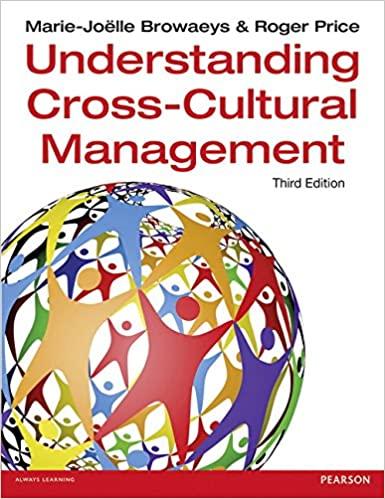For pragmatic Chinese, adopting English names has long represented a way for them to bridge the linguistic
Question:
For pragmatic Chinese, adopting English names has long represented a way for them to bridge the linguistic and cultural gap. Now, as China widens its reach abroad and as the number of foreigners living in mainland China swells, picking an English name has become a rite of passage for most young, urban Chinese.
When students enrolin Chinese universities, they routinely are required to pick English names as a way to prepare themselves for life in their increasingly Westernized world. Students race to snap up the ‘best’ English names on a list the schools circulate. ‘Popular names like Michael and Alex go quite fast, and Eddie was already gone before I could choose it’, said Eddy Wu, 19, a student at Beijing Forestry University, explaining that he wanted the name because it sounded like his Chinese name, Di. ‘So I said “OK, let me take Eddy with this other spelling.” ’People usually adopt only English first names and retain their Chinese family name. The practice is informal and has no legal significance. Sometimes, the results can be quirky, with Chinese names that potentially mystify foreigners often being replaced with English aliases that amuse them.
Super Zhang, 25, a paralegal in Beijing, said he chose his English name because it is a literal translation of his Chinese one, Chao. ‘I like to see myself as a great and extraordinary person’, Super said. ‘People wonder about my name all the time and are always asking me to explain it. But I still enjoy having it.’
Most Chinese take their English name – its meaning, its sound, and its associations with historic figures – very seriously. Promise Hong, a 30-year-old writer in
Beijing, said her English name was a rough translation of her Chinese one, Xu, and that she saw a philosophical connotation in it.
‘Promise has more profound meanings especially with the biblical background of the promised land’, she said. ‘I began to use it when I was a freshman in college, 12 years ago, and some people I’ve met have expressed their kind appreciation and curiosity about my choice.’
In nineteenth-century China, choosing an English name was the privilege of only a handful of elites.
Possessing one was a status symbol indicating that a person had been to college and rubbed shoulders with the ‘laowai’, the Puntonghua word for foreigner. The process of picking the name often involved weeks of discussions between the person, English tutors and foreign friends. Chinese sages would then vet the short list of names for their tonal qualities and astrological powers.
That English names are now ubiquitous in urban China is a sign of the country’s progress, Eddy said. ‘My parents tell me how once any foreigner on the street would be stared at, they were so unusual’, he said. ‘Now, China is developing very fast and Chinese are becoming very modern.’ While most Chinese with English names reserve their use for times when they are in the company of foreigners, Eddy said more people, especially young women, prefer using their English names. This is particularly true for Chinese immigrants in the US and other English-speaking countries, who use their Western names to help them fit into their new world. Wentao Zhang, 40, began calling herself Wendy while living in New Jersey for 15 years. ‘It just makes things easier’, she said. ‘People (in the US) used to find it really hard to say my name, so I began saying “Just call me Wendy” and it worked really well.’
This phonetic approach, picking a new name that sounds like your original one, sidesteps the pitfalls of trying to find English translations of Chinese names. Of course, not every Chinese person has an English name. In the sleepy hamlets that dot the countryside, farmers and workers look surprised at the thought of taking an English name. And sometimes, name changes alone are not enough to bridge the cultural gap.
Apple Li, 21, a travel agent in Beijing, said she chose her English name because her Chinese name is Ping and the Mandarin word for apple is ‘pingguo’. But one problem remains: her business card reads Li Ping, since the Chinese write their family name first and given name second. Many foreigners accustomed to the Western format assume that Li means apple in Mandarin, she said. Adding to the confusion is that Li, when written using a certain character, means pear.
Questions
1. What are the reasons given for young Chinese adopting an English first name?
2. Do you think that this custom can help to improve communication between China and Western countries? Explain why.
3. What changes, if any, do you think the use of English names brings to the Chinese way of doing business? Explain your point of view.
Step by Step Answer:

Understanding Cross Cultural Management
ISBN: 9781292015897
3rd Edition
Authors: Marie Joelle Browaeys, Roger Price





